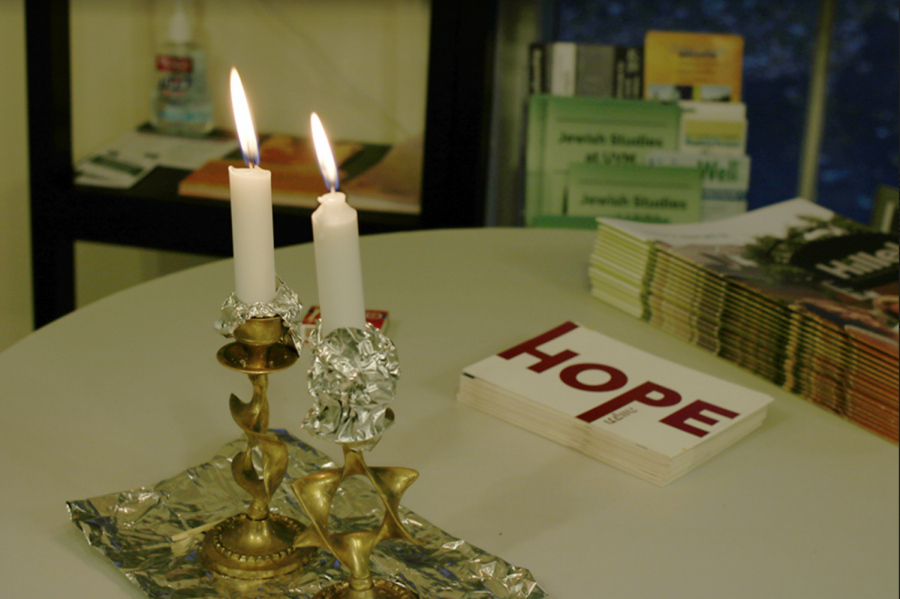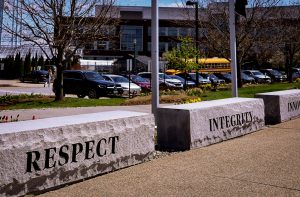Grieving the Pittsburgh Shooting as a Jewish Student
November 6, 2018
When I first heard the news about the shooting in Squirrel Hill, Pittsburgh in which a white nationalist murdered 11 members of the Tree of Life synagogue, the first thing I felt, strangely, was annoyance.
“Of course this was bound to happen sometime,” I thought to myself. “But couldn’t it have waited until next week?”
I would have been surprised in that moment to know that in an hour I would set about organizing a vigil for the victims of the shooting.
This initial sensation of paralysis was compounded by the fact that, atypically, I had spent that afternoon alone, which was only reason I was even using my phone.
Many people don’t use their phones on Shabbat, which lasts from Friday night at sundown to Saturday at twilight, because it’s designed as a day of rest and disconnection from the larger world to spend time with friends and family.
This doubles Oct. 27’s tragedy, as millions of observant Jews first learned of the shooting when they turned on their phones after 25 hours of peaceful time with family and friends.
Because I was alone and unable to speak with people affected as deeply as myself by the news, I felt myself slipping into a coma of numbness and cynicism.
Then, about an hour after the headlines had overwhelmed my Facebook feed, I saw a text message from a close friend who was also home by themselves and using technology.
It simply said, “how are you doing?”
I explained that I was really mostly feeling numb. Even as I wrote this, though, I began to feel a sense of comfort. Just this simple message had affected me deeply. In just a few words, my friend has reassured me: “It’s OK to feel overwhelmed. This is a big deal. You’re not overreacting.”
As I continued scrolling through my Facebook feed, I saw an event that a liberal Jewish group from New York that I follow had created: “Havdalah Vigil for Squirrel Hill.”
Not more than five minutes after I had first replied, I sent my friend another message.
“I think I’m going to organize a Havdalah vigil.”
Havdalah is the ceremony at the end of Shabbat; it marks the separation between the rest of the Sabbath and the work of the rest of the week.
I broke the Sabbath in about 10 different ways in the next few hours. It was a blur of text messages, editing prayers, buying candles and gathering supplies.
By the time I arrived in front of the David W. Howe Memorial Library at 6:20 p.m. with three bags of supplies, I was agitated, emotional and nervous. I was comfortable leading Havdalah, but how would everything else go? Would people come?
Suffice it to say, nearly 40 people did come, and things happened as they were meant to. We did Havdalah with the intention of separating ourselves from the pain the day had held. Together, we recited the traditional Mourner’s prayer, the Kaddish.
We sang a song praising the world’s beauty that was written by a Hungarian Jewish woman named Hannah Szenesh while she was imprisoned in a Nazi concentration camp.
We sang the traditional concluding song, which speaks of the prophet Elijah coming to usher in a world without strife. As the last notes faded away, I finally felt the surge of emotion I had been searching for all day. I first choked back tears, and then I wept.
Across campus, students and faculty had been dealing with the tragedy in their own way.
“It’s hard to see all of the hate that is growing in this world,” said junior Neilah Rovinsky, a member of UVM Hillel’s student board. “To see [this happen to] such a beautiful and socially active synagogue just breaks my heart.”
President Tom Sullivan sent a campus-wide email Oct. 28.
“The Jewish community is in real need of [our support and compassion] now,” he stated. “I know that our caring UVM family will respond with kindness and understanding.”
The next day, UVM Hillel director Matt Vogel sent out his own statement.
“The entire Hillel movement is in mourning as we reflect on the abhorrent murder of Jews who had come together to worship in Pittsburgh,” he stated.
He said that the Hillel house is open all day offering snacks, blankets and a safe space for students to mourn.
Emma Bauer is a Jewish student and leader of Vermont Youth for Gun Sense, a gun reform advocacy organization formed by the student organizers of last spring’s March for our Lives Montpelier rally.
“This past weekend has been filled by immense hopelessness, anger, and fear that my school or my synagogue could be next,” she said.
She said she draws hope from the dedicated survivors and activists she works with.
First-year Alexis Cady, a student from Squirrel Hill, echoed this sentiment while addressing the interfaith gathering that packed City Hall’s Contois Auditorium Oct. 30.
“I never thought this could happen to me,” she said.
She was hoping for a day in which no young person ever has to grapple with the same sense of disbelief and hurt, she said.
How soon that day may come can’t be said, but this week, Jews on campus are yearning for it.







